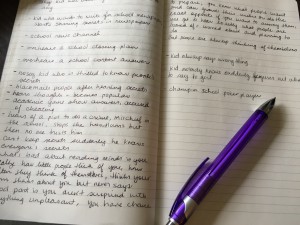Ready for some writing goals? I’m gearing up for another year of reading and writing (and running, because that helps more than you might think!) I’m not setting resolutions per se, but I do constantly set goals and work on them. I like to set a mix of short and long term goals, that way I can feel good about meeting short term ones along the way and keep up my momentum on the long term goals.
Reading Goals
For my reading goals, I’m going to aim for 100 books again in one year. You can find me on Goodreads and see what books I’m reading, but I generally don’t write reviews of books. I just move on to the next book. I do love working off of lists and I think this year I’ll find the list of Newbery Award winners and see which ones I’ve read and seek out the ones I haven’t. I also don’t know the criteria for the Newbery, so that will be something good to learn.
Writing Goals
For my writing goals, I plan to continue to submit my existing stories (including Dare Club, The Red Deer of Fal and Mission: Compostable!) But I want to have a new manuscript ready to pitch at conferences. I have two drafts of middle grade novels I can revise, and I think I’m going to work on my magical realism one and get that ready for the spring.
My process for the magical realism novel has been a little unusual. Here’s a brief outline:
Step 1: Write the novel during NaNoWriMo 2014.
Step 2: Let it sit for over a year.
Step 3: Ask myself “what’s funny about gaining the ability to read people’s thoughts?”
Step 4: Ask myself “what kind of character would get himself into trouble from hearing people’s thoughts?”
Step 5: Read books like Wired for Story: The Writer’s Guide to Using Brain Science to Hook Readers from the Very First Sentence and think about what people love to read.
Step 6: Attend conferences, like Pennwriters, and learn about brainstorming 20 ideas of things that could happen to your character.
Step 7: Accumulate rejections for other stories.
Step 8: Try not to think about how long it took to revise Dare Club to something I was proud to share.
Step 9: Finally sit down and brainstorm ideas in my super-creativity-enhancing notebook.
Step 10: Read a Reddit post about the pros and cons of mind-reading.
Step 11: Take a nap.
Step 12: Wake up and decide to go to Target. Suddenly get inspiration for a starting point while driving!
In this story, which doesn’t have a great title but I’ve been calling Buyer Beware, a middle school boy finds a piece of magical technology that allows him to read people’s thoughts. I know I want to tell a story that follows the lines of “what starts out seeming like an amazing discovery that will solve all of his problems and make his dreams come true eventually gets him into trouble.”
See, the story can’t be about the mind-reading device. It has to be about the kid. And for it to be something I love, the kid needs to be funny and likable, and the kid needs to mean well but screw up, and the kid needs to win in the end. I’m not the person to write about child refugees and kids dealing with horrible experiences. I’m the person to write about ordinary kids (like myself) who thought they wanted to be extraordinary and made some dumb mistakes as they figured out how to get through life.
I think I’ve got a plan, now. I think I have a problem and a desire for my main character, and a framework for things that my character will do, and how it might culminate into an interesting climax with a satisfying conclusion. If you’re interested let me know and you can critique my next draft – when it’s ready!


